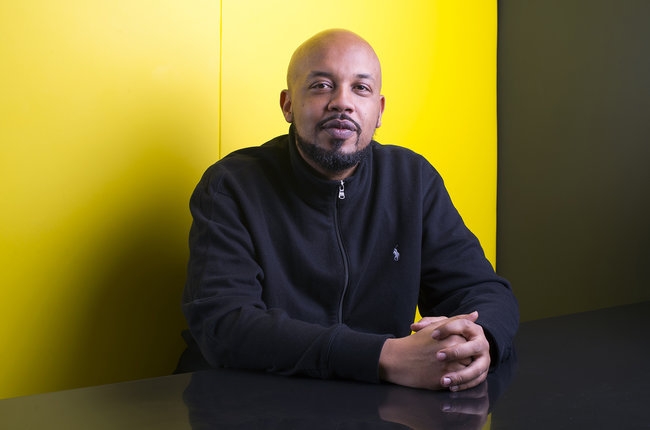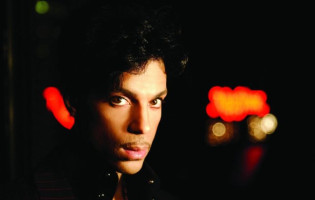Spotify’s Tuma Basa is one popular dude. Despite the power he wields as Spotify’s global head of hip-hop, in which people all over the globe are gunning for his blessing to be included on the hugely popular RapCaviar playlist (with over 7 million followers) he oversees, among others, he is incredibly grounded. The former programmer for Revolt, MTV and BET straight up refuses to take any individual credit for his playlists’ successes, instead crediting collaborations across Spotify and, most critically, the wealth of data to which he has access.
"The amount of information I have, I almost feel like I’m cheating," Basa says. "What the audience wants is all right there."
In between his modesty, Basa seems philosophical as he talks about "tire-kicking" songs; the "reputation economy"; how listening critically to music is like tasting soup; and avoiding the “same ol’ same ol ’same ol’ same ol" conundrum. Here, too, are are also practical tips non-naming conventions and building a story that may just someday land your music on one of Spotify's playlists.
Billboard: Do you have to wear a mask when you go out?
Tuma Basa: [Laughs] Nah, I chose this life. Everything’s a blessing.
Do you have a lot of "friends" lobbying you to get on Spotify playlists?
I have a concept called “good problem, gratitude.” You’re talking about volume of communications and stuff like that -- that’s a good problem to have when people are interested in your take, or they want to get something on your radar.
If you’re an unknown artist and you have the greatest song in the world and you want it on RapCaviar, how should they approach you?
I just like information and knowledge, qualitative and quantitative. Qualitative, like, "What’s the story? Where is this coming from? Who’s the crowd, what kind of momentum, what stage of the life cycle is it at?" Wherever the song and the artists’ movement are at.
And how do you get that information?
I have the ability to verify through our tools and our back end to see if people are searching for it, if it’s being put on people’s personal playlists or if it’s being saved. If we put it on a playlist, we can see whether those placements are converting to people saving them onto their own playlists or saving them to their own music, or if they’re following the artist. We can tell the passive listeners from the active listeners. The fan, the super fan and if they become loyalists; we have all kinds of categories.
Do people ever misrepresent the data they’re pitching you on?
Even as we speak on the phone, I can be looking at fan insights and verify if they’re B.S.’ing or not, which, back in the day, was not possible. And when I say back in the day, I’m talking about a couple of years ago. Now it’s all in real time. It’s like, “You’re telling me someone is the hottest rapper out Dallas?” I can go look while we’re on the phone.
Do you ever correct people when the data’s wrong?
I tell them what’s happening on our platform with our audience. But it’s still music, and this is still life, and anything can happen, right? When Vine was around and something was popping on Vine, it was just a matter of it trickling to Spotify’s users' behaviors. But I don't like to leave room for misinterpretation or disrespect with correcting somebody.
Do you ever feel like a data analyst?
No, no, that’s just a tool. That’s just a vehicle. It’s the difference between a wagon and a car; the data is basically just making it more efficient. But it’s still about how hot something is in the gut. Music is still an emotional product. We’re not talking widgets or units of something, this is like whether it makes you move or not. The data just basically is saying what immediate attention is there.
How many emails do you get per day?
I get thousands. I get a lot. Wanna know a trick? When I’m at home and I want to hear some music and I'm about to vibe out, I do an inbox search for "open.spotify," which for a lot of Spotify links is the naming convention. And I listen to a whole bunch. People who include Spotify links in their emails get some kind of advantage.
How do you have time to listen to all of that?
I’m not going to listen to the whole song. In my world it’s like having a soup: I can taste a teaspoon of the soup, I can tell if the soup is hot, if it needs more salt, if it’s oily. I won’t listen to a whole song; that’s a waste a time, at least until the beat drops and then you can tell.
But you might be getting 2,000 soups a day in front of you.
We live in an internet world, and in an internet world you have a reputation economy, whether it be Yelp or Uber or Airbnb, where people give each other stars. I’ve been doing this long enough to know the people who are going to bring me the dope stuff. And people have track records and social capital, which people in positions like myself know that they had better not come with some B.S. If I know so and so is always on a roll or has a track record who is reputable in terms of them helping to eliminating garbage records, guess what? I’m gonna pick up the phone, I’m gonna check out the record and give them feedback.
So social capital matters.
Not even just as your job, but in the culture. We’re talking about a culture. We’re talking about a community of people. If you’re part of this, if you’re immersed in this and you know what you’re doing, if you’re culturally competent, you're not just fulfilling duties and a job, this is your life.
How many people work under you?
We have a different structure at Spotify, I work in several departments. It’s not the typical reporting structure like you have at other companies I have worked at. It’s very collaborative and we have global curators all over. They do their own thing, they’re not reporting to me. We get together once a week and discuss what’s happening in our markets and if it’s relevant to other markets. They’re all experts and specialists. They’re putting me onto stuff, I’m putting them onto stuff. It’s more collaborative than anything else.
What other ways do you find music?
It might come from a show last night where the crowd responded to one particular song that doesn’t seem to be on the radar; or it might come from the studio visit, where they’re like, “We have this song but you don’t have to...” And then, Pow! That was the song, that was it. So there’s also that part where the energy and reaction in the room where the artist can come in and play us music and everybody is bobbing their head; and then on another song everybody’s looking at their phones.
By the way, that’s how you keep things interesting, because otherwise it becomes formulaic and boring and that starts to showing up in your work. And it doesn’t feel like you’re enjoying the work because you’re doing the same ol', same ol', same ol', same ol'.
Do you ever find songs you love that have poor metrics, but then later catch fire?
Yeah, that’s happened several times, actually. If I experience that discovery, then there can be a ripple effect where someone else experiences that discovery. We don’t call it an emotion, but there’s a feeling that comes with discovering music, discovering excitement. It’s just like nostalgia; there’s an emotion that comes with nostalgia and reconnecting with music that reminds you of the 8th grade. That happens all the time.
What’s the hardest part of what you do?
There’s a discipline factor where I have to remember it’s not about me, it’s about the audience. If I like something, I have to translate in my head: “I like it, does that mean the audience is gonna like it? What reasons do I like it?" I have to do a root-cause analysis in my head. "The beat, oh. This, oh. So and so carried that track. Is that what people care about? So and so’s verse was wicked, but do people care about people’s verses?" I have to do tire-kicking in my head.
What track are you most proud of discovering?
That’s like asking what’s your favorite child. I could’t answer that.
What are the best practices for approaching you?
On my email, there’s a form, it’s like a Google doc where you can put your track on there, the name, etc., and get on my radar at least. If I keep on hearing about the same song from unrelated people independently, whether it be from web sites or on our platform or just going out and about, that increases the likelihood of it sticking.
How do you handle the stress of everyone coming at you?
I’m happy. I’ve been doing this a long time and I’ve never seen it at this level of feedback from audiences. I like detailed feedback from the audience. Sometimes even when I’m doing my work, the amount of information I have, I almost feel like I’m cheating, because it’s all right there. The answers are right there. What the audience wants is all right there.
In the past, in this line of work, there was a lot more guess work that used to happen. That guess work has been eliminated by these tools that makes us super-serve or hyper-serve our audience. As somebody who also loves this stuff and is also part of the audience, I’m just grateful that we’ve gone this far, that it’s gotten this good. It’s about the music and the culture; that’s the reason why we do this. It helps us get it right, rather than dictating and imposing what we want. This is what the audience wants, and it’s right there and we’re very accountable.
With so much instant feedback, are you ever like, "Crap, I should have done this or that"?
But you can fix it, that’s the cool thing. Playlists are not static, they’re living, breathing organisms that are constantly evolving and changing. In one of those moments you can easily go and alter [something] as soon as you realize it. That’s probably why people like them so much; it’s like a pencil with a eraser on it. I’m writing in my note pad and making this great song and then, "Whoa, hold on a sec." Then I take my eraser and, "Let me change that to that... Ahhh, this is perfect!"
You’re a gatekeeper with thousands of people wanting your attention.
Well, first of all, I’m not a gatekeeper. I don’t want to be called that. I feel like the gatekeeper era is over. The gatekeeper era is the past, when magazine editors, A&Rs, program directors, they all could determine people’s lives and everything. I consider myself a facilitator. My job is not a bouncer to keep people out or to kick people out, it’s to get people in. It’s to get the right people in and to keep the party popping.
What do you tell all the people coming at you?
I tell them, go build a story, go build a playlist on Spotify. Use our platform to build a following and for us to see the traction. I really, really love what 2 Chainz did with Trap Music, but it was a playlist. That guy was updating playlists and having guest curators like Kevin Durant and Erykah Badu on his playlists.
I would encourage all the people on the outside to get on Spotify, build these playlists, build followings on playlists, the same way you would build a following on Instagram or build a following on Twitter. We’ll see that activity and say, "Hey, this is organic. This is happening. This is energetic. This is momentum, this is traction, this is popping."
Ed. Note: This interview was conducted on June 30, 2017 and has been lightly edited for clarity and length.








